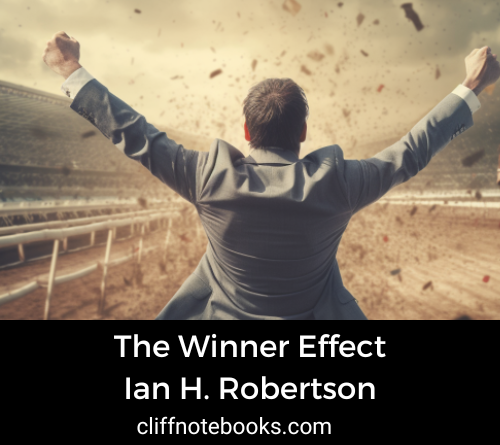The Winner Effect | Ian H. Robertson | Cliff Note Books
“The Winner Effect” by Ian H. Robertson explores the phenomenon of how winning influences individuals’ behavior, mindset, and future success. Drawing on research from neuroscience, psychology, and animal behavior, the book examines the physiological and psychological changes that occur in winners and the lasting impact of winning on individuals and society.
The book is divided into several sections that cover different aspects of the winner effect. Here is a summary of the main themes discussed in the book:
The Science of Winning: The book introduces the concept of the winner effect and explains how winning triggers a cascade of neurochemical changes in the brain. It explores the role of hormones, such as testosterone and dopamine, in shaping winners’ behavior and the brain’s reward system.
The Power of Winning: The book examines the profound impact of winning on an individual’s self-confidence, motivation, and future success. It explores the “winner-loser” effect and how winning can create a positive feedback loop that leads to further success.
The Biology of Power: The book delves into the physiological changes that occur when individuals gain power and authority. It discusses the impact of power on cognitive functions, decision-making, and social behavior.
Winning and Losing in Society: The book explores how the winner effect manifests in different areas of society, such as sports, politics, and business. It discusses the dynamics of competition, the effects of winning and losing on individuals and groups, and the implications for social hierarchies.
The Dark Side of Winning: The book addresses the potential negative consequences of the winner effect, such as overconfidence, aggression, and unethical behavior. It highlights the importance of maintaining balance and self-awareness in the face of success.
Throughout the book, Robertson combines scientific research, real-life examples, and personal anecdotes to illustrate the concepts and implications of the winner effect. He offers insights into how winning can shape individuals’ behavior, influence social dynamics, and impact society at large.
“The Winner Effect” provides a fascinating exploration of the psychological and biological mechanisms behind winning and its effects on individuals and society. It offers valuable perspectives for understanding the dynamics of success and sheds light on the complex interplay between biology, behavior, and achievement.
Quotes from The Winner Effect
“Winning rewires the brain, creating a neurochemical cascade that alters behavior, motivation, and future success.”
“The power of winning lies not just in the moment of victory but in the lasting effects it has on an individual’s confidence and drive.”
“Success breeds success, as winning creates a positive feedback loop that fuels further achievement.”
“The biology of power reveals how gaining authority can lead to significant physiological and cognitive changes.”
“In the game of life, winning and losing shape our identities and influence our behaviors.”
“The dark side of winning lurks in the potential for overconfidence and unethical behavior.”
“Competition drives the winner effect, as individuals strive to outperform and rise to the top of social hierarchies.”
“Winning and losing are not mere outcomes but powerful forces that shape our psychology and shape the world around us.”
“The winner effect transcends individual victories, impacting societal structures and dynamics.”
“Understanding the winner effect sheds light on the complex interplay between biology, behavior, and the pursuit of success.”
Biography of Ian H Robertson
Ian H. Robertson is a psychologist and neuroscientist known for his research on cognitive neuroscience, brain function, and behavior. He has held various academic positions throughout his career, including professorships at Trinity College Dublin and the University of Toronto. Robertson has written several books and published numerous scientific articles in his field. While I don’t have access to a detailed biography of Ian H. Robertson, you may be able to find more information about him through online sources or by referring to his professional profiles and publications.
Criticisms of The Winner Effect
Overemphasis on biological factors: Critics might argue that the book focuses too heavily on the biological aspects of winning, potentially overlooking other social, cultural, and environmental factors that influence success and behavior.
Lack of nuance: Some readers may feel that the book oversimplifies the complex nature of winning and its effects. They may argue that it fails to adequately address the various contextual factors and individual differences that contribute to outcomes.
Limited practical application: Critics might argue that the book doesn’t provide enough practical guidance or actionable steps for individuals seeking to harness the winner effect or make meaningful changes in their lives.
Lack of interdisciplinary approach: Some readers may suggest that the book could benefit from a more interdisciplinary perspective, incorporating insights from fields such as sociology, anthropology, or economics to provide a more comprehensive understanding of winning and its implications.
Incomplete exploration of negative aspects: Critics might contend that the book doesn’t fully delve into the potential negative consequences or drawbacks of the winner effect, such as the impact on mental health, relationships, or ethical behavior.
